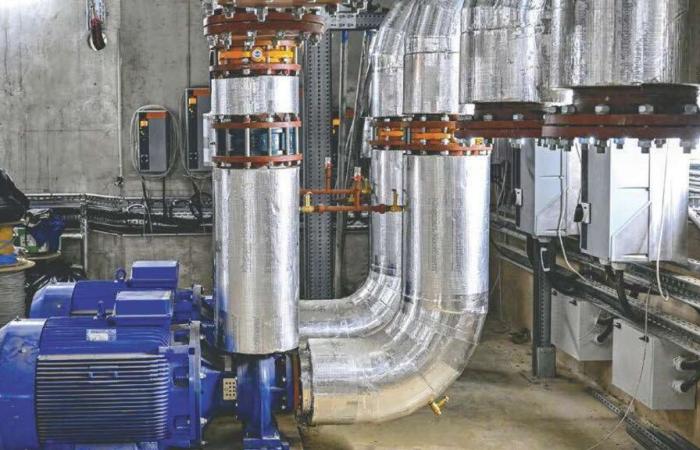Montpellier Méditerranée Métropole (Hérault) has reached a new milestone in its energy transition with the geothermal power plant inaugurated on May 2 in the ZAC Cambacérès, south of the city. Representing a maximum power of 11 MW of heat and 15 MW of cold, the equipment is considered the largest geothermal project on aquifer in France. Designed by the Coste Architectures firm and the Ingérop design office to eventually supply 450,000 m2 of commercial and educational buildings, it mobilized an investment of €17.5 million excluding tax, including a €4.6 million subsidy from Ademe. Currently, the Montpellier Sud de France train station and the Halle de l’innovation, representing 50,000 m2 of space, are connected.
Underground water. Circulating in a closed circuit using two boreholes 350 m apart – one for pumping at a depth of 180 m, the other for discharge at a depth of 200 m – the groundwater passes through three thermo-refrigeration pumps which recover the heat and cold from the water table via exchangers. “It is drawn at a maximum rate of 350 m3/h and discharged into the water table without any physicochemical changes or impact on its temperature, which remains stable over the year at 17°C,” explains Steve Lechevalier, design and works engineer at Serm (Altémed group).
The next network to be put into service will be that of Nord Alco, which will gradually supply homes in the Mosson and Cévennes districts from 2025, as well as educational establishments and the university hospital in the north of Montpellier. It will draw its energy from the 20,500 tonnes of wood consumed per year by its biomass boiler.
Little by little, the metropolis is moving forward with its strategy to triple the surface area served by urban heating networks by 2030. By that date, 5 million m2 (i.e. more than 45,000 housing equivalents) will be heated by 80% renewable energy: wood, geothermal energy or waste energy recovery. Not counting the two networks described above, the territory has 13 public boiler rooms (i.e. 112,500 MWh and a network 29,610 linear metres long) in operation in Montpellier and seven other private ones (18,695 MWh and a network of 6,247 ml) located in the peripheral municipalities of Castelnau-le-Lez, Juvignac, Lattes and Pérols.
Selected for you







